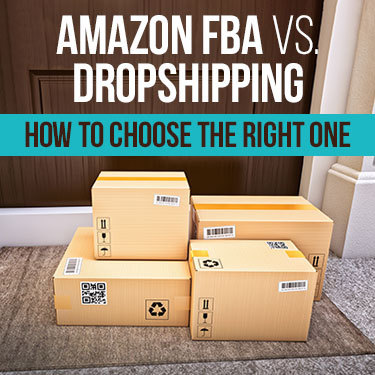
 Copy URL to Clipboard
Copy URL to Clipboard
If you’re looking to start an eCommerce business, you might be feeling a bit overwhelmed at the variety of different options available for selling online. Even if you’ve narrowed down your options to Amazon FBA or dropshipping, it can still be tough to choose between those two. Both options have their fair share of benefits and drawbacks, but they are ultimately two of the best options for online sellers.
Both Amazon FBA and dropshipping are great options for entrepreneurs looking to break into eCommerce. When choosing between them, you’ll need to consider profit margins, shipping times, investments, risk, and many other factors. Ultimately, you will need to decide which factors are the most important to you.
In our guide below, we explore the differences and similarities between the two and also provide you with a third option that many entrepreneurs are now utilizing.
Table of Contents
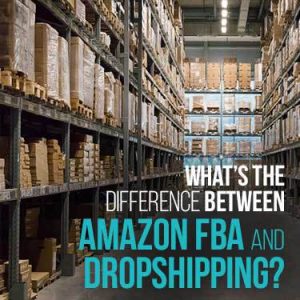
Before we move on, it’s important for you to understand what Amazon FBA and dropshipping is, and how those two options differ from one another. Though they may sound similar in theory, there are many factors that set them apart.
Dropshipping is the process of selling goods on behalf of another store, supplier, or manufacturer. If you were to start dropshipping, you would take up the task of marketing and selling the supplier’s goods. When you make a sale, the manufacturer gets notified and ships the order for you. You never have to see the products, and you don’t need to purchase any stock up-front.
FBA stands for “Fulfillment By Amazon,” and it is the process by which your stock is stored in an Amazon warehouse and fulfilled by Amazon employees. Because of the nature of the program, you DO need to purchase stock up-front AND pay for storage, but your products would then be eligible for Prime Shipping and listings on Amazon (in addition to your website). Like with dropshipping, however, you wouldn’t need to worry about fulfilling orders yourself.
The biggest differences between the two options relate to product inventory. With Amazon FBA, you need to provide the warehouses with products, which means several things. You would need to invest more money in the beginning to get your business off the ground, and you will also need to keep track of that inventory so you know when to order more. You wouldn’t need to do any of that with dropshipping. Aside from that, the two options function similarly.
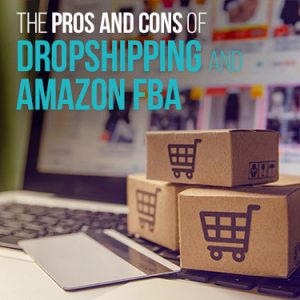
Both Amazon FBA and dropshipping are great options for starting an eCommerce store, but one might be better for your particular business. Depending on your products, starting funds, amount of free time, and more, you might end up benefiting from one option more than the other.
To get a good idea of which option is better for you, you’ll need to weigh the pros and cons of both dropshipping and Amazon FBA and compare them to each other.
Dropshipping is often touted as the number one way to make money online by eCommerce gurus (and with good reason), but you shouldn’t just take their word for it. Examining the perks that make it so great is the first step towards making an educated decision regarding your business.
The biggest benefits of choosing dropshipping over Amazon FBA are:
With all that said, running a dropshipping store isn’t all smooth sailing. There are some drawbacks and difficulties associated with it, otherwise, everyone would be doing it!
As with any business model, you need to be aware of the negative aspects before you commit to it. Here are the less-than-glamorous aspects of dropshipping that you should know about:
If those drawbacks sound manageable to you, dropshipping might be the way to go! However, you should still consider all your options before settling on a decision.
Amazon is a glamorous option for online entrepreneurs, and you’ve no doubt been tempted by all their flashy perks. Here’s a run-down of some of the best benefits of choosing Amazon FBA over dropshipping:
There’s no doubt about it: Amazon is a tempting choice. However, like with dropshipping, it’s not without its flaws.
It’s hard to look past all the great benefits of Amazon, but it has its fair share of negatives as well. Amazon FBA isn’t a perfect solution for eCommerce fulfillment. Here are some of the biggest drawbacks of the FBA program:
Now that you know all the major pros and cons of Amazon FBA and dropshipping, you can make a more educated decision about which one is right for you.
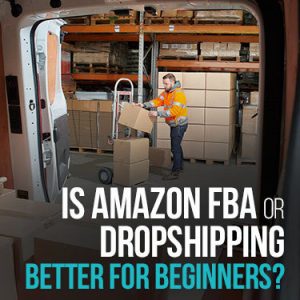
If you’re just getting started in the world of eCommerce and you don’t have a lot of experience with running a business, then you’ll probably want to pick dropshipping over Amazon FBA.
Dropshipping is the most beginner-friendly option.
That’s the quick answer, but here’s an explanation for why that’s the case. It all boils down to the risks involved. If you’ve never sold anything online before, and you have little to no experience with running a business, you should minimize your risk as much as possible. With dropshipping, you have much less to lose.
Without having to worry about inventory, you can more safely experiment with which products sell well, how to maximize profits, and what the best marketing techniques are. Once you get a business established and you’re more confident in your abilities, you can move on to a different business model if you want—or not! Dropshipping is a great option for businesses of any size, and you can continue to make a profit as your business scales up.
If you read through the pros and cons of both Amazon FBA and dropshipping, and you aren’t sure you want to use either option, you don’t have to worry. There’s another option that can offer you the customization of dropshipping with the quality and speed of Amazon: a Third Party Logistics Company (3PL).
It might take you some extra effort to track down a good 3PL, but that can truly offer you the best of both worlds. Like with Amazon, you would need to acquire your own stock to store in the 3PL warehouses, but unlike Amazon, you can have full customization over packaging, kitting and assembly, packaging inserts, shipping options, and much more. When you work with Amazon, they call the shots, but a 3PL works for you.
If you aren’t happy with the options provided by dropshipping and Amazon FBA, then you should consider working with a 3PL instead.
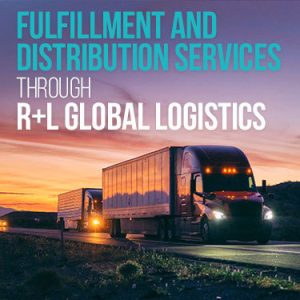
If you’re tired of comparing the disadvantages of Amazon FBA vs dropshipping, then it may be time to consider the better option.
R+L Global Logistics is a leader in the 3PL industry, with a focus on quality, customer service, and accessibility. We pride ourselves on our ability to serve any sized company in any industry, and we never compromise on the service we provide. If you want a widespread distribution partner with locations all across the US, but also the values and service of a decades-old family-owned business, then look no further!
At R+L Global Logistics, we offer a wide variety of value-added services to take your distribution to the next level. These services include:
In addition to that, we can provide multilingual staff members to communicate with you on your terms and to facilitate the most effective communication possible. When you work with us, you become part of the R+L family.
If you want more information on the services we provide, you can reach out to us at (866) 989-3082. Our friendly customer service representatives are always happy to help.
If you’re interested in working with us, you can request a free fulfillment quote right on our website.
